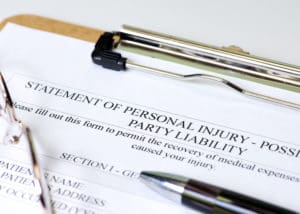Settling a Catastrophic Injury Case
January 31, 2019
Contributory Negligence
The impact of a catastrophic injury, as previously explained, can be loss of income and other economic and non-economic damages, including hospital bills, physical therapy bills, lost wages, other economic losses, future hospital bills, loss of future income, and lost earning capacity.
If you live in a contributory negligence state and your injury was a result not only of another person or another entity’s negligence, but some of your own negligence, you may be barred from any recovery.
In other words, if you, for example, are a pedestrian and you are struck in the roadway where you have a ‘do not walk sign,’ you may be found to be contributory negligent and may be barred from any recovery, meaning you will get zero dollars if there’s a finding of contributory negligence.
Medical Bill Rewards

For those reasons, oftentimes where you are discussing a settlement even with respect to a catastrophic injury, you will be negotiating at an amount far less than your ideal or your ideal jury award. In addition, to have hospital bills and other medical bills awarded, they must be fairly reasonable, necessary, and causally related to the accident. Defendants and insurance companies will always argue that your bills are too high, not reasonable, or that they were incurred because of either some underlying issue or some previous injury and not because of the accident. In other words, they’re not causally related to the accident.
When you’re negotiating with an insurance company you must keep in mind that insurance companies are looking to get a discount in all the medical bills. Medical bills have become inflated and insurance companies are keenly aware of this.
What Types of Damages Can Someone Seek?
As discussed in the previous section, a person that is injured can seek compensatory damages such as economic damages and non-economic damages. Although in some cases you may, generally you will not be awarded punitive damages. Punitive damages are only awarded where conduct was reckless or intentional.
The most common type of catastrophic injury would be a traumatic brain injury. This type can come about in your ordinary rear-end auto accident case, a low impact case, or they can come in at a high-speed collision auto accident case.
Traumatic brain injuries each are of their own kind. It is oftentimes hard to distinguish the severity based upon simply looking at pictures of an accident. Neurologists will agree that catastrophic injuries, specifically traumatic brain injuries, are simply hard to treat. Other common types of catastrophic injuries are fractures, compound fractures, internal bleeding, brain bleed, and spinal cord injuries.
In a rear-end auto accident case or in auto accident cases generally, along with traumatic brain injuries, spinal cord injuries are the second most common injury that you see. A spinal cord and in fact, they might be the most common injury that you see. A spinal cord injury, including a bulging disc or herniated disc, or even fracture, are oftentimes the result of an auto accident. They require extensive treatment, they are debilitating, and cause people to miss large amounts of work.
What Else Should Someone Know About Catastrophic Injuries?
Catastrophic injuries, like any injury in any negligence claim, are going to be hardly fought by the other side. The most common thing that personal injury lawyers see from the other side is that a catastrophic injury is somehow not causally related to the accident.
For example, a client is in a severe car accident and they sustain a torn rotator cuff along with a torn meniscus, back injuries, rib injuries, etc. A defendant is wary about avoiding money for any of these injuries based upon the age, the sex, the race, and the background of a person.
A defendant will look into all of the past medical records that it can get its hands on and they will try their very hardest to argue and to prove that these injuries occurred prior to an accident.
Lying About Injuries
Although that is the case and it can be dealt with by your Clinton personal injury lawyer, it is a harder hole to dig out of if you lie about your past injuries.
The cardinal sin that you can commit in a personal injury action, particularly when you have a catastrophic injury, is to lie about your past.
If, for example, you are in a severe auto accident, and it turns out prior to this accident, you were receiving injections in your back or you were receiving treatment for a sore knee or a sore shoulder and you sustained what you believe to be further injuries in your shoulder, knee or back, it will not help your case to lie about these past injuries. Openness will allow your attorney to come up with arguments that they’re your claims for these injuries. However, if you lie on the record about your past injuries, it is not a mistake that can be easily fixed.
Other Types of Catastrophic Accidents

Catastrophic injuries are seen in a number of different types of accidents. It would be a mistake, however, to assume that catastrophic injuries can only be the result of a major high-speed car accident. Catastrophic injuries can be the result of a simple low speed, rear-end collision, a pedestrian accident, a bicycle accident, or a slip and fall.
If symptoms arise after an accident that were never present before an accident, it is vital that you get yourself treated and get these injuries diagnosed by a medical doctor. The longer you wait to see a medical doctor, especially if your injury is catastrophic in nature, the harder it will be to causally relate any treatment to that accident for that injury.


